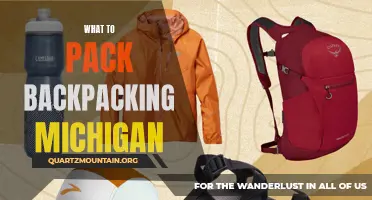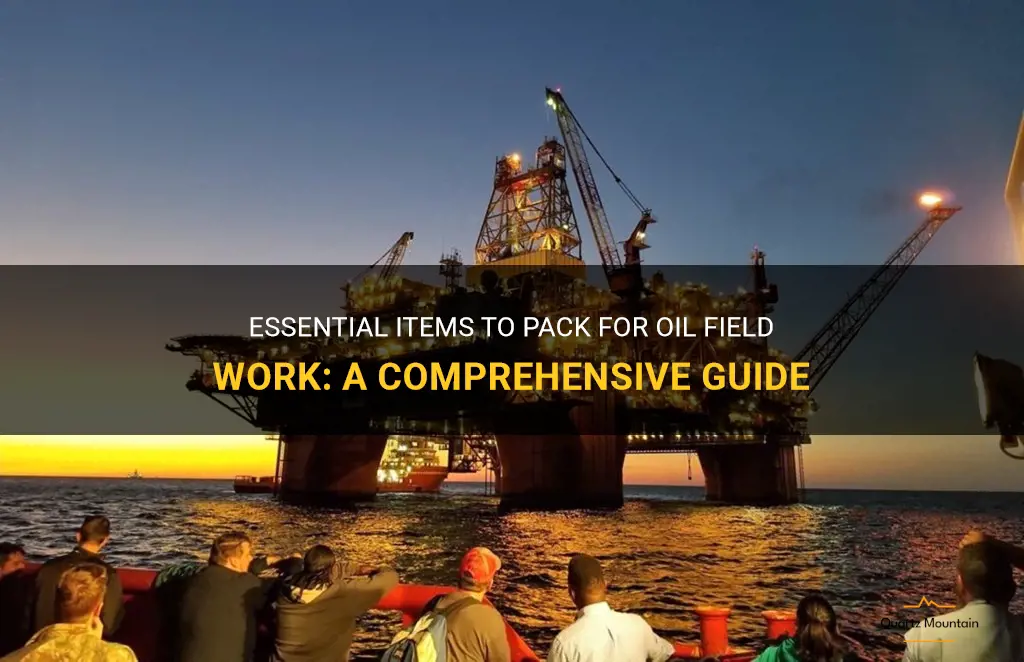
Are you heading out to work in the oil fields? Whether you're a seasoned field worker or a newcomer to this challenging and rewarding industry, it's crucial to be prepared with the right tools and equipment. In this comprehensive guide, we will walk you through the essential items you need to pack for oil field work. From personal protective equipment to durable work boots, we've got you covered. Don't leave anything to chance – read on to ensure you're fully equipped to tackle the demands of the oil fields.
What You'll Learn
- What are the essential items to pack for an oil hitch?
- Are there any specific clothing items that are necessary for working in an oil field?
- What personal protective equipment should be included in the packing list for an oil hitch?
- Are there any recommended tools or equipment to bring for working in an oil field?
- Are there any specific guidelines or regulations regarding what can and cannot be packed for an oil hitch?

What are the essential items to pack for an oil hitch?
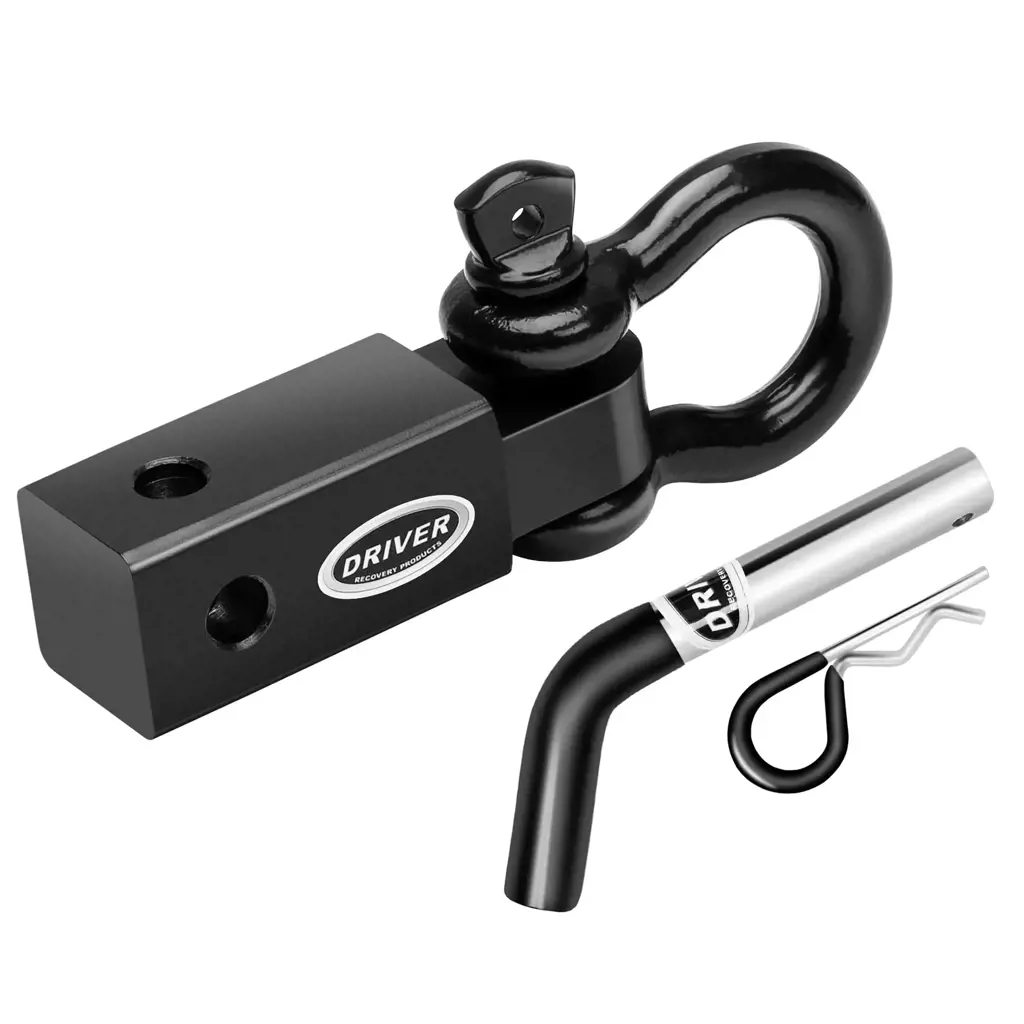
When preparing for an oil hitch, there are several essential items that you should pack to ensure your safety, comfort, and productivity. These items can vary depending on the specific type of oil rig and location, but here are some general suggestions to consider:
- Safety gear: Safety should be your top priority on an oil rig. Make sure to pack a hard hat, safety glasses, steel-toed boots, and a reflective vest. These items will protect you from potential hazards such as falling objects and chemical spills.
- Personal Protective Equipment (PPE): In addition to the general safety gear mentioned above, you should also pack PPE specific to your role on the rig. This may include flame-resistant clothing, gloves, ear protection, and a respirator or dust mask.
- Tools: Depending on your job responsibilities, you may need to bring specific tools. Common tools include wrenches, pliers, screwdrivers, and a multi-tool. Make sure to check with your employer or supervisor to determine what tools you will need to bring.
- Medications and first aid kit: It is important to have any necessary medications with you, as well as a basic first aid kit. The first aid kit should include bandages, antiseptic ointment, pain relievers, and any other items you may need in case of injury or illness.
- Clothing: Since you will be working in a potentially hazardous environment, it is important to pack appropriate clothing. This may include long-sleeved shirts, pants, socks, and underwear made from fire-resistant materials. You should also pack extra clothing for off-duty hours and any personal hygiene items you may need.
- Bedding and personal items: Most oil rigs provide basic accommodations, including a bed, sheets, and towels. However, you may want to bring your own bedding for added comfort. Additionally, pack any personal items you may need, such as toiletries, a towel, and a change of clothes for time off the rig.
- Entertainment and communication devices: While on the rig, you may have downtime between shifts. It is a good idea to bring entertainment devices such as books, e-readers, or a portable gaming console. You should also bring a mobile phone or other communication device to stay in touch with friends and family back home.
- Food and water: Depending on the rig's facilities, you may need to bring your own food and water. It is important to pack non-perishable items that provide the necessary energy and nutrition for your work. Consider items like protein bars, canned goods, and bottled water.
- Personal flotation device (PFD): If you work near or on open water, it is essential to have a personal flotation device. This will help keep you safe in case of an emergency or accident.
- Documentation: Make sure to bring any necessary documentation, including your identification, work permits, certifications, and medical records. These documents may be required for entry onto the rig or for any emergencies that may arise.
Remember, these are general suggestions, and you should always check with your employer or supervisor for any specific requirements or recommendations before packing for your oil hitch. By packing these essential items, you can ensure your safety and productivity while working on an oil rig.
Essential Items to Pack for Your Next Fitness Retreat
You may want to see also

Are there any specific clothing items that are necessary for working in an oil field?
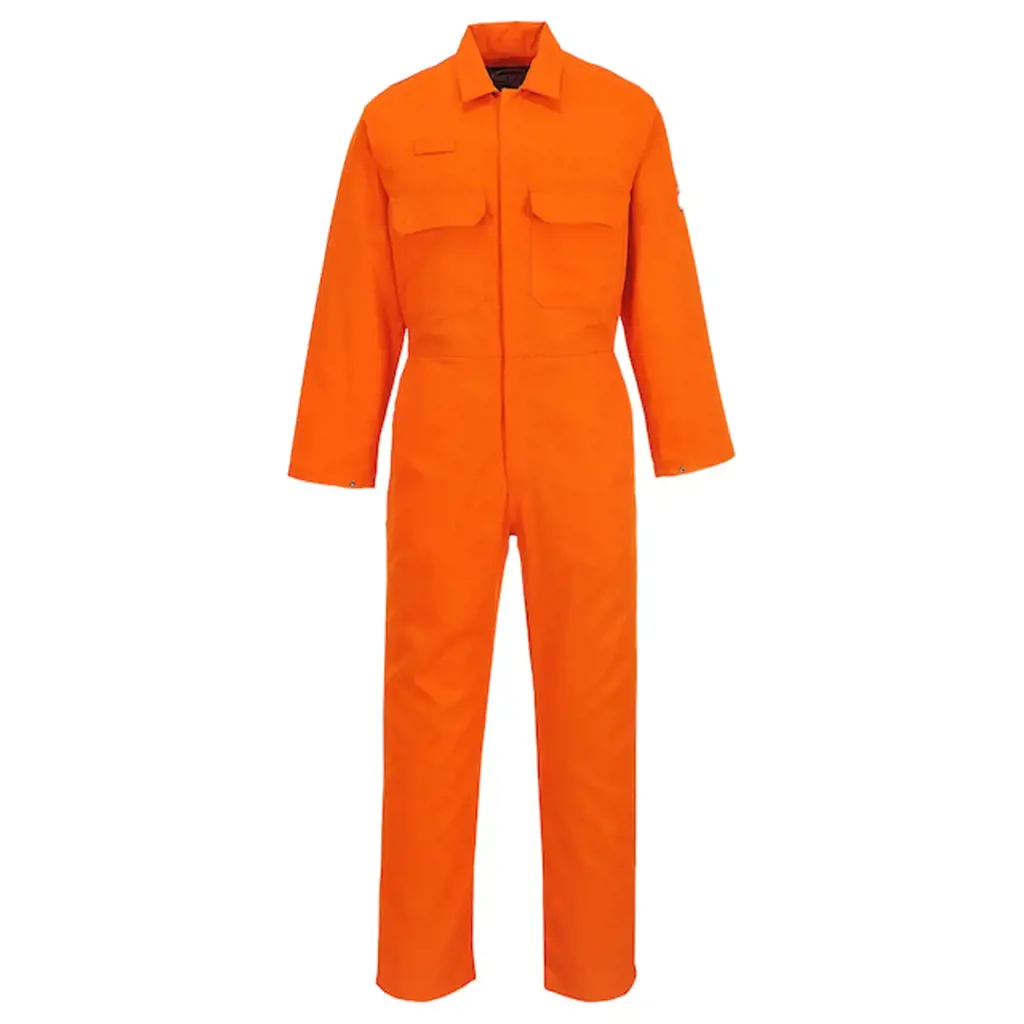
Working on an oil field is a demanding and potentially dangerous job that requires the right protective clothing. The clothing worn by workers in this industry is designed to provide both safety and comfort in this challenging environment. While there are no specific clothing items that are absolutely necessary, there are some common ones that are highly recommended for working in an oil field.
One of the most important clothing items for working in an oil field is a flame-resistant coverall. These coveralls are made from fabrics that self-extinguish when exposed to flames or high heat, providing protection against flash fires or other fire hazards that may occur on the job. They are usually made from materials such as Nomex or Kevlar, which are known for their flame-resistant properties.
In addition to flame-resistant coveralls, workers in an oil field should also wear a sturdy pair of steel-toe boots. These boots are designed to protect the feet from heavy objects falling or rolling over them. They also have puncture-resistant soles to prevent injuries from sharp objects on the ground. Steel-toe boots are essential for maintaining foot safety in an oil field, where there is a high risk of accidents and injuries.
Another important clothing item for working in an oil field is a hard hat. Hard hats are designed to protect the head from falling objects, impacts, and electrical hazards. They are made from a strong and durable material such as polyethylene and often have suspension systems inside for added comfort and impact absorption. Wearing a hard hat is a crucial safety measure that can prevent serious head injuries in the event of an accident on the job.
In addition to these essential clothing items, workers in an oil field should also wear protective gloves and safety glasses. Gloves provide protection for the hands and fingers, preventing injuries from cuts, abrasions, and chemical exposure. Safety glasses protect the eyes from flying debris, chemicals, and other hazards that may be present in the workplace. Both gloves and safety glasses should be made from materials that are suitable for the specific tasks and hazards involved in working in an oil field.
It is worth noting that the specific clothing requirements may vary depending on the specific job and location within the oil field. For example, workers who are directly involved in handling hazardous chemicals may need to wear additional protective clothing, such as chemical-resistant suits or respirators. Therefore, it is important for workers to follow the safety guidelines and regulations set by their employer and the relevant regulatory bodies.
In conclusion, there are several specific clothing items that are highly recommended for working in an oil field. These include flame-resistant coveralls, steel-toe boots, hard hats, protective gloves, and safety glasses. These clothing items are designed to provide the necessary protection and safety for workers in this challenging and potentially dangerous environment. It is crucial for workers to wear the appropriate clothing and follow the safety guidelines to minimize the risk of accidents and injuries on the job.
Essential Clothing Items to Pack for a Trip to Ukraine
You may want to see also

What personal protective equipment should be included in the packing list for an oil hitch?
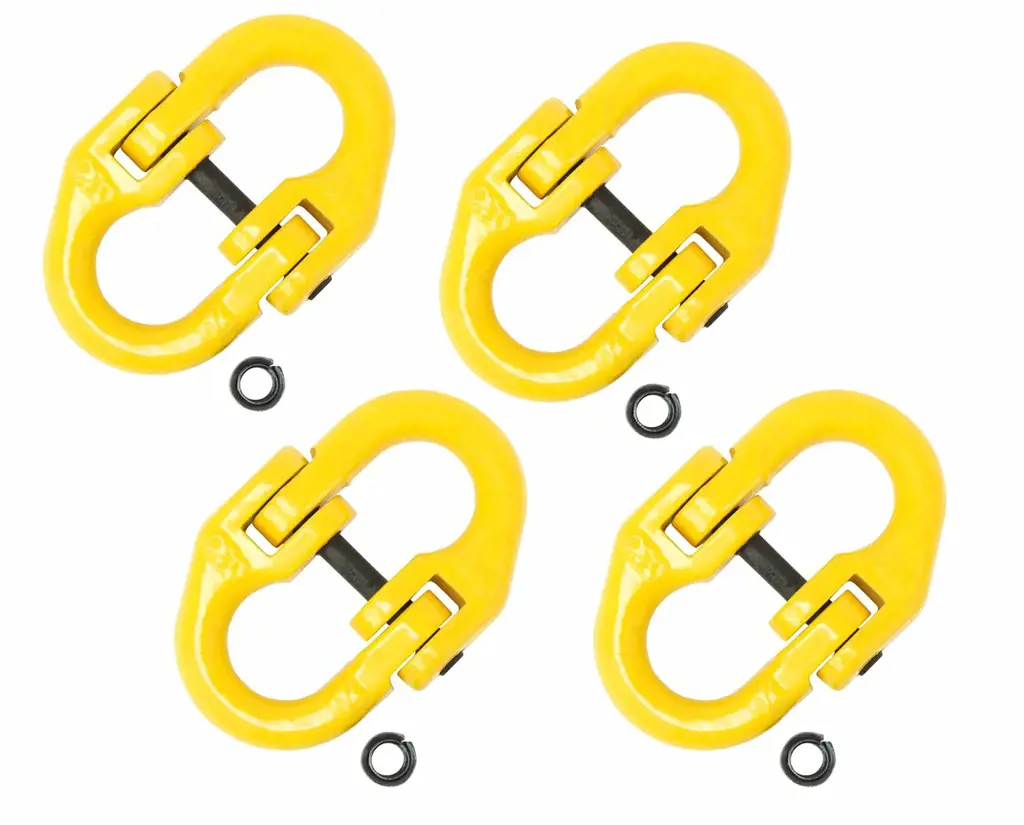
Personal protective equipment (PPE) is crucial for ensuring the safety of workers in potentially hazardous environments such as oil hitches. These oil hitches involve working with flammable substances, heavy machinery, and other potentially dangerous elements. Therefore, it is of utmost importance to include the necessary PPE in the packing list for an oil hitch. Here are some essential items that should be included:
- Hard Hat: A hard hat is a must-have in an oil hitch as it protects the head from falling objects, impacts, and other hazards. It is important to ensure that the hard hat fits properly and is worn at all times in the work area.
- Safety Glasses: Safety glasses are essential for protecting the eyes from flying debris, chemicals, and other hazards. They should be comfortable, ANSI-approved, and provide adequate coverage for the eyes.
- Ear Protection: Working in an oil hitch can expose workers to high noise levels generated by heavy machinery. To prevent hearing damage, ear protection such as earplugs or earmuffs should be included in the packing list.
- Gloves: Oil hitches often involve handling slippery materials, sharp objects, and chemicals. Therefore, appropriate gloves should be worn to protect the hands from cuts, burns, and chemical exposure. The type of gloves required may vary depending on the specific tasks involved, such as chemical-resistant gloves for handling hazardous substances.
- Safety Boots: Safety boots with steel toes and puncture-resistant soles are essential in an oil hitch. These boots provide protection against heavy objects falling on the feet and reduce the risk of injuries from sharp objects on the ground.
- Flame-Resistant Clothing: When working with flammable substances, wearing flame-resistant clothing is crucial. This type of clothing is designed to self-extinguish and reduce the risk of severe burns in case of an ignition event.
- Respiratory Protection: Oil hitches may involve exposure to airborne contaminants, such as dust, fumes, or toxic chemicals. Respiratory protection, such as respirators or dust masks, should be included in the packing list to ensure the workers' safety.
- Fall Protection: If working at heights is involved in an oil hitch, fall protection equipment, such as harnesses and lanyards, should be included. This equipment is essential for preventing falls and reducing the risk of serious injuries.
Remember, the specific PPE requirements may vary depending on the nature of the oil hitch and the tasks involved. It is important to conduct a thorough hazard assessment to identify the specific risks and determine the appropriate PPE for the job. Providing the necessary PPE and ensuring its proper use is crucial for maintaining a safe working environment in oil hitches.
Essential Items to Pack in Your Hand Luggage for a Stress-Free Journey
You may want to see also

Are there any recommended tools or equipment to bring for working in an oil field?
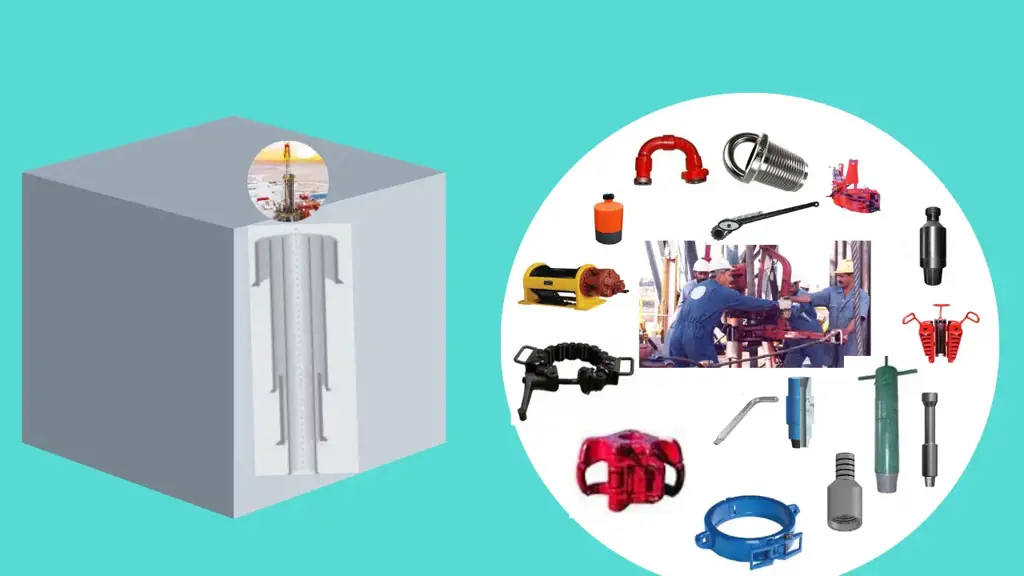
Working in an oil field can be a challenging and demanding job. It requires the use of specialized tools and equipment to ensure safety and efficiency. Here are some recommended tools and equipment to bring when working in an oil field:
- Personal Protective Equipment (PPE): PPE includes items such as hard hats, safety glasses, gloves, and steel-toed boots. These are essential for protecting yourself from hazards such as falling objects, chemicals, and high temperatures.
- Lifting and Rigging Equipment: Oil fields often require moving heavy objects and equipment. Bringing lifting and rigging equipment, such as slings, shackles, and winches, can make these tasks easier and safer.
- Hand Tools: A variety of hand tools are necessary for performing various routine tasks in an oil field. This includes wrenches, pliers, screwdrivers, and hammers. These tools can be used for maintenance and repairs of equipment and infrastructure.
- Power Tools: Power tools can help you perform tasks more efficiently. Examples include drills, impact wrenches, grinders, and saws. However, it is important to use these tools correctly and ensure that you have the appropriate training to do so.
- Measuring and Testing Equipment: Measuring and testing equipment is crucial for maintaining quality control and safety in an oil field. Examples include pressure gauges, thermometers, vibration monitors, and gas detectors. These tools help identify potential issues and ensure that operations are running smoothly.
- Communication Devices: In an oil field, communication is vital to ensure coordination and safety. Two-way radios, cell phones, and satellite phones are essential for staying connected with colleagues and responding quickly to emergencies.
- Personal Gas Detection Devices: Oil fields can be hazardous environments, with the potential for exposure to toxic gases. Carrying a personal gas detection device with you at all times can alert you to any dangerous levels of gas and allow you to take appropriate action.
- Fire Safety Equipment: Fires are a significant risk in the oil industry. Having fire extinguishers and fire blankets readily available can help to control small fires before they escalate. Additionally, ensuring you know the location of emergency exits and fire alarms is crucial for a safe working environment.
- Safety Harness and Fall Protection Equipment: Working at heights is common in an oil field, such as when inspecting or maintaining equipment on a rig. Carrying a safety harness and fall protection equipment, such as lanyards and anchor points, is necessary to prevent falls and minimize the risk of injury.
- First Aid Kit: Accidents can happen in any workplace, and having a well-stocked first aid kit is essential. This should include bandages, antiseptics, gloves, and other basic medical supplies to provide immediate assistance in case of injuries.
When working in an oil field, it is important to ensure that you have the necessary tools and equipment to carry out your tasks safely and effectively. By being prepared and equipped with the right tools, you can help minimize risks and contribute to a successful and productive oil field operation.
Essential Items for Women to Pack for a June Trip to Italy
You may want to see also

Are there any specific guidelines or regulations regarding what can and cannot be packed for an oil hitch?

Oil hitches are temporary assignments where workers are deployed to work on offshore oil platforms or drilling sites. These hitch assignments typically last for several weeks or months, and workers are required to pack all the necessary supplies and equipment to ensure their safety and productivity during their time at the oil hitch. However, there are specific guidelines and regulations that need to be followed when packing for an oil hitch to ensure compliance with safety standards and regulations.
One of the main considerations when packing for an oil hitch is the type of personal protective equipment (PPE) that needs to be brought along. PPE is essential to protect workers from potential hazards such as chemical exposure, fire, and falling objects. Some of the commonly required PPE items for an oil hitch include safety helmets, safety glasses or goggles, hearing protection, flame-resistant clothing, safety gloves, and steel-toe boots. These items are designed to provide adequate protection in the harsh and potentially dangerous working conditions on an oil platform.
In addition to PPE, workers also need to pack other essential items such as work tools, personal hygiene products, medications (if required), and comfortable clothing. Work tools may include wrenches, screwdrivers, and other basic hand tools that are necessary for carrying out daily tasks on the oil platform. Personal hygiene products are important to maintain cleanliness and prevent the spread of illness or infection while living in close quarters with other workers. Medications, if needed, should be packed in sufficient quantities to last for the duration of the oil hitch.
When packing for an oil hitch, it is crucial to follow specific regulations regarding the transport of hazardous materials. Hazardous materials include chemicals, fuels, and other substances that can pose a risk to health, safety, or the environment. These materials must be properly labeled, packaged, and stored to prevent leaks or spills during transport. Workers should also be aware of the proper procedures for handling and storing hazardous materials to minimize the risk of accidents or exposure.
Additionally, workers should be familiar with the specific guidelines and regulations set by the company operating the oil platform or drilling site. These guidelines may vary depending on the company's policies and the location of the oil hitch. It is important to read and understand these guidelines thoroughly to ensure compliance and safety while on the oil platform.
To ensure that all necessary items are packed for an oil hitch, it is helpful to create a checklist. This checklist should include all the required PPE, work tools, personal hygiene products, medications, and any other items specific to the oil hitch. By following a checklist, workers can ensure that they have packed all the necessary items and minimize the risk of forgetting something important.
In conclusion, there are specific guidelines and regulations that need to be followed when packing for an oil hitch. These guidelines include packing the necessary PPE, work tools, personal hygiene products, medications, and following regulations for the transport of hazardous materials. It is important to familiarize oneself with the company's guidelines and create a checklist to ensure that all necessary items are packed for a safe and productive oil hitch experience.
The Essential Checklist for Packing for Your Holiday Vacation
You may want to see also
Frequently asked questions
When packing for an oil hitch, it is important to consider the duration of your stay and the specific requirements of your job. Some essential items to pack include work clothes (such as coveralls and steel-toe boots), personal protective equipment (such as hard hats, safety glasses, and gloves), toiletries, bedding (such as sheets and a pillow), and a first aid kit. Additionally, it is recommended to pack enough clothes for the duration of your stay, as well as any necessary medications and a form of identification.
The requirement to bring your own tools for an oil hitch can vary depending on the company and the specific job you will be performing. In some cases, the company may provide all necessary tools and equipment, while in others you may be required to bring some of your own. It is best to check with your employer beforehand to see if you need to bring any specific tools or equipment.
When it comes to clothing for an oil hitch, it is important to prioritize safety and comfort. The most common attire for oil field workers is coveralls, which provide full-body protection. You should also pack steel-toe boots to protect your feet from potential hazards. Additionally, it is recommended to pack extra pairs of socks, underwear, and t-shirts. Depending on the weather conditions and location of the oil field, you may also want to pack additional layers of clothing for warmth or protection against the elements.
Yes, there may be restrictions on what you can pack for an oil hitch. It is important to check with your employer or the company you will be working for to ensure you are aware of any specific restrictions. Some common restrictions may include the prohibition of alcohol, illegal drugs, firearms, or other items that could be considered a safety risk. It is always best to follow the rules and guidelines set forth by your employer to ensure a safe and productive work environment.



